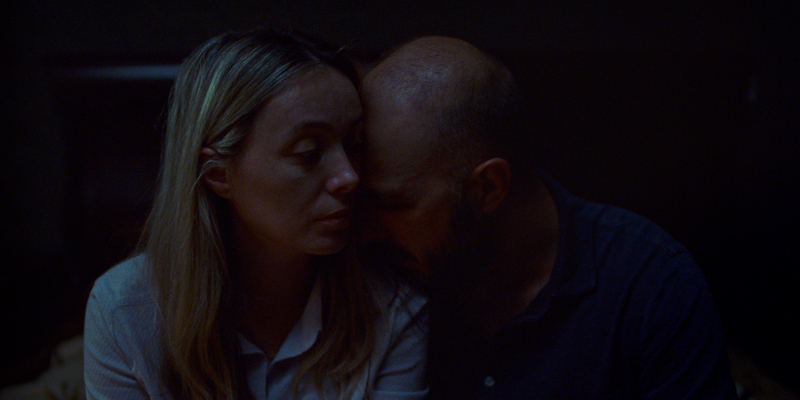
Review by
Eric Hillis
Directed by: Dea Kulumbegashvili
Starring: IIa Sukhitashvili, Rati Oneli, Kakha Kintsurashvili, Saba Gogichaishvili

European filmmakers sure love treating their female protagonists like pin
cushions. Don't get me wrong, this has given us movies as great as Lars von
Trier's Breaking the Waves, Michael Haneke's The Piano Teacher and Isabella
Eklöf's
Holiday, but sometimes watching these women endure emotional, psychological and
physical pain makes you wonder if you aren't simply watching an arthouse
variation of torture porn. That's how I began to feel at the midway point of Déa Kulumbegashvili's technically accomplished directorial debut Beginning.
Fittingly, given its title, Kulumbegashvili's film opens with what we
may well recall as the most arresting opening shot of 2021. A camera remains
static at the back of a Jehovah's Witness meeting house in rural Georgia as
parishioners file in and take their seats before the preacher, David (Rati Oneli, who co-wrote the script with Kulumbegashvili), begins a sermon on the story of Abraham. The sermon
rambles on for about five minutes, and just as we're beginning to nod off
like the bored kids in the pews, a petrol bomb is tossed into the hall and
suddenly the congregation is under attack.

Based on this opening scene, you might expect Beginning to
explore religious persecution in the Eastern European nation, but after
capturing our sympathy towards this minority group, Kulumbegashvili immediately turns us against David and his beliefs. In a
bedroom interaction with his former actress wife, Yana (Ia Sukhitashvili), we see how miserable she is in the controlling,
male-dominated world of Jehovah's Witnesses. Yana tries to express her
discontent, but David accuses her of being selfish at a time of crisis for
their people, and leaves for a few days to meet with the Church elders in
Tbilisi.
While David is away the narrative morphs into something approaching a
Haneke directed remake of Chantal Akerman's Jeanne Dielman. We spend a lot of time simply observing Yana pottering in her kitchen
or walking through the countryside, and at one point the camera lingers
for an uncomfortable eternity as Yana lies motionless in a field, ignoring
the cries of her son, who believes she has passed away.

Such slow cinema sequences are broken by the presence of Alex (Kakha Kintsurashvili), a sinister creep who arrives at Yana's
apartment claiming to be a police detective investigating the attack on
the church. Within minutes it's clear he's either an impostor or a
decidedly bad lieutenant as he interrogates Yana regarding her sex life
with David. Later he returns for a predictably nastier encounter.
After an opening half that keeps us on our toes,
Beginning descends into a box-ticking exercise of European
shock cinema. But at this point, we've seen so many of these films that
they've completely lost their ability to shock. At various times
Beginning feels like it's nodding to Ulrich Seidl, Gaspar
Noe, the Romanian New Wave, Carlos Reygadas, Andrei Tarkovsky, Haneke,
Akerman and any number of World Cinema auteurs. If an approximation of the
darker arthouse classics is enough to satisfy you, then you'll certainly
get your fill here. But Kintsurashvili never quite expresses her own personality, and it often
feels as though she's making the narrative up on the fly. You can imagine
her chewing on a bic, thinking "What would von Trier do here?" or "Hmmm,
it's been 25 pages since the last onscreen atrocity, how can I up it?"
Beginning opens with a striking scene of horror, only to
outdo itself halfway through and culminate with one of humanity's greatest
taboos. But by that point we just shrug our shoulders, as it all feels so
predictable.

As misery porn goes, it has to be said that this is one of the more
pleasingly pornographic examples of the form, in the eye candy sense. With
a narrow 1.33 frame, Kintsurashvili and cinematographer Arseni Khachaturan have fashioned a genuinely visually stunning
work. If Kintsurashvili can't find a way to distinguish herself, she certainly
impresses with her ability to ape the style of the various filmmakers
previously mentioned, and the opening sequence of the burning church would
have Tarkovsky and Reygadas feeling outdone. Such striking visuals, along
with the quietly engaging performance of Sukhitashvili, keep us along for the ride, but this is a rollercoaster
we've ridden a few too many times.


